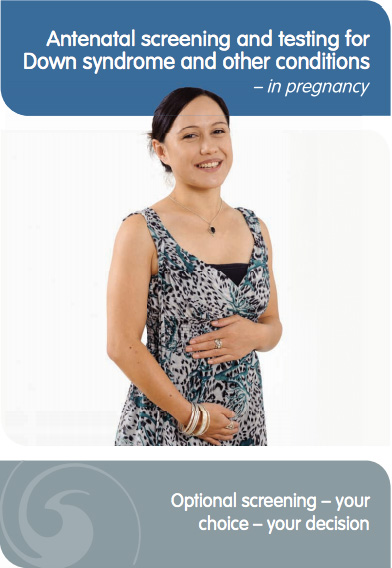If you're a frequent visitor to Healthify, why not share our site with a friend? Don't forget you can also browse Healthify without using your phone data.
Antenatal blood tests
Key points about pregnancy blood tests
- Pregnancy (antenatal) blood tests are carried out during pregnancy to check on the health of you and your baby.
- They are also done to look for any unsuspected health concerns which can then be treated to reduce risks to the pregnancy and possibly to your family/whānau.
- Find out about what tests are done and why.

Routine antenatal care has been developed to ensure the best possible health for you and your pepi/baby. There are a few basic blood tests that every pregnant/hapū woman is recommended to have in every pregnancy. Most of these are done as soon as you realise you are pregnant. These blood tests are to ‘screen’ (look) for unsuspected health issues. If these are treated as soon as possible it will reduce risks to your pregnancy and sometimes to the wider family/whānau.
In addition, your GP or LMC (lead maternity carer) may recommend further optional tests for you, based on your personal or family medical history, and should discuss these with you.

Image credit: Canva
These blood tests are explained briefly below, with more detailed information available both on Healthify and from your health care professionals.
First routine antenatal screen
This is performed ideally in the first 12 weeks of your pregnancy, or at the first appointment if it takes place after 12 weeks:
- Full blood count
- Blood group (including Rhesus D status) and antibody screen
- HbA1c (diabetes check)
- Rubella
- Syphilis
- Hepatitis B
- HIV
In addition, a urine sample is recommended.
Second routine antenatal screen
Performed at 24-28 weeks:
- full blood count
- blood group antibody check
- diabetes test.
Third routine antenatal screen
Performed at 34-36 weeks:
- full blood count
- blood group antibody check in rhesus negative women.
Optional tests for all pregnancies
- Genetic screening for Down Syndrome and similar conditions.
Common additional tests recommended for some women
- Iron levels in your blood.
- Thalassaemia screen.
- Hepatitis C.
- Genetic testing for hereditary disorders.
- Chlamydia and gonorrhoea vaginal swab.
- Cervical screening – HPV primary screening test.
Full blood count
This measures the haemoglobin level in your red blood cells, which may be low if you are anaemic. This is most commonly due to lack of iron in your body, but there are some rarer causes. If you are anaemic, you will feel tired and sometimes short of breath. Pregnancy requires extra iron, both for your baby and yourself. If you are found to be low in iron, you will be advised to replace it by eating iron-rich foods and/or by taking iron tablets. Occasionally, if required, iron can be given by an injection into your blood. Treatment helps your symptoms and prepares for any bleeding at birth.
Platelets are also measured – these help your blood to clot. There are a few rare but potentially dangerous reasons for these to be low.
A routine blood test will also include identifying what blood group you have inherited from your parents. Read more about blood group testing.
Diabetes testing
Diabetes is a medical condition where the glucose levels in the bloodstream run too high. You may already know that you have this, or it may be diagnosed during a pregnancy screening test. You may also develop a type of diabetes that occurs during pregnancy called gestational diabetes. Read more about testing for diabetes when you are pregnant.
Screening for infections
A range of infectious diseases are screened for during pregnancy. These include:
- Rubella immunity (German measles): Rubella is a rare virus that most people have been vaccinated against in childhood. However if you get it while you are pregnant it can cause severe birth defects in your baby (eg, blindness, deafness or heart defects).
- Syphilis: A sexually transmitted bacterial infection that used to be rare, but is becoming more common around the world. It can pass through the placenta to your baby and can cause a stillbirth or serious problems such or deafness, seizures or birth defects.
- Hepatitis B: A viral infection that can be also be passed from a mother to her baby during pregnancy, and in many countries this is the most common way that people have been infected. You may or may not already be aware that you have been infected.
- Human Immunodeficiency Virus (HIV): A virus that can cause a chronic infection which progresses to severe AIDS (Acquired Immunodeficiency Syndrome) and death if not treated. It can be passed on to your baby through the placenta, during birth or through breastfeeding. Read more about HIV testing in pregnancy.(external link)
Read more about screening for infections when you are pregnant.
MSU (Mid-stream urine sample)
This is recommended for all women as part of the first routine antenatal screen. It is quite common to have some bacteria in the bladder that do not cause any symptoms. If they are not treated in pregnancy, they can lead to a severe bladder or kidney infection with symptoms, and also cause a miscarriage or premature (early) delivery. If you are found to have bacteria in the urine sample, you will be recommended to have a short course of antibiotic tablets, which are safe to take in pregnancy. You will also be asked to repeat the urine sample to check the bacteria have gone, and again if you have any symptoms of a bladder infection. A few women with repeated bladder infections in pregnancy are recommended to take a daily antibiotic tablet.
Down syndrome screening
These tests are available to all pregnant women in New Zealand, but they are optional, and you may choose whether or not you want to be tested. Down syndrome (also called Trisomy 21) is a genetic condition that can happen by chance, and affects around 1 in 700 pregnancies. There are two much rarer genetic conditions (Edwards and Patau Syndromes) that are also screened for in these tests. Babies affected by one of these genetic conditions have an increased risk of miscarriage, stillbirth, death as a baby or a wide range of long-term physical and mental disabilities. Read more about testing for Down syndrome.
Common additional tests recommended for some women
Iron levels in blood
Low iron levels can lead to anaemia (see explanation above), and are more common in pregnancy due to the increased requirement for iron.
Thalassaemia screen
Thalassaemia is an inherited condition that affects how red blood cells are made, and therefore causes anaemia. It is usually found in people of Mediterranean, African or South Asian descent, and your health professional will often recommend testing if you have this heritage. If it is mild, you may not be aware that you are affected, but it can have implications both for your health in pregnancy and for the baby, particularly if your partner is also affected.
Hepatitis C
Hepatitis C is similar to Hepatitis B in how it is acquired and possible health effects. It is not as common in Aotearoa New Zealand, but your health professional will recommend testing if you have risk factors that suggest a higher chance you may have the virus.
Genetic testing for hereditary disorders
Some genetic diseases are clearly passed down through the generations, and your health professional may suggest referral to a geneticist to discuss testing yourself and possibly your baby if you do have a clear family history.
However, most genetic diseases occur in couples with no family history, and optional screening for some of these (cystic fibrosis, spinal muscular atrophy, fragile X syndrome) is now available. It is usually recommended before you get pregnant, but can be done in pregnancy. You would need to pay for it yourself.
Chlamydia and gonorrhoea vaginal swab
These are both sexually transmitted diseases which are becoming more common. If you do not realise that you have been affected, they can cause long-term problems for you (eg, pelvic pain, infertility) and/or the pregnancy (risk of miscarriage or severe premature birth). Your health professional may recommend testing in early pregnancy. If it is detected, treatment is effective and safe in pregnancy.
Cervical screening
It is recommended that all women in Aotearoa New Zealand have a cervical screening test every 5 years, starting at 25 years of age, or earlier if there are concerning symptoms. Cervical cancer is a treatable disease if detected in the early stages. If you have never had a cervical screening test, or are overdue for one, your health professional will recommend one at booking. If pre-cancerous or cancerous cells are suspected, further examinations and even treatment can be performed in pregnancy, while undiagnosed cervical cancer in pregnancy can cause problems such as vaginal bleeding which may be difficult to diagnose and treat by that stage.
Your results will be available from the health professional who organised your blood tests. All test results are confidential. If you need any support, information or treatment you will be referred to the appropriate healthcare professional and receive care that is professional, respectful and confidential.
If you would like more information about these or other screening tests/programmes, or need to have information in a different language, please ask your midwife, GP or specialist or visit the National Screening Unit.(external link)
Apps
Resources
Here is a range of resources for pregnant women and new parents.(external link)
Antenatal blood test factsheet(external link) National Screening Unit, NZ, 2016
Antenatal screening and testing for Down syndrome and other conditions – In pregnancy(external link) HealthEd, NZ, 2020
Pregnancy and parenting education for you and your whānau [PDF, 2 MB] Auckland DHB, NZ
Brochures

Auckland DHB, NZ
Credits: Healthify editorial team. Healthify is brought to you by Health Navigator Charitable Trust.
Reviewed by: Dr Janet Crofts, Obstetrician, Auckland
Last reviewed:
Page last updated:






